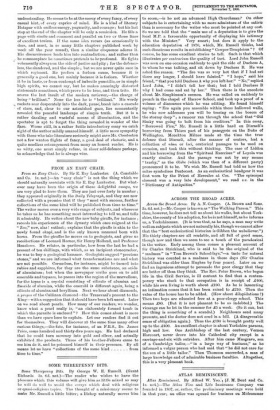ALL THINGS CONSIDERED.
All Things Considered. By G. K. Chesterton. (Methuen and Co. 5s.)—Mr. Chesterton " cannot understand the people who take literature seriously." There should be something curiously interesting in what Mr. Chesterton so gladly confesses he cannot understand. Perhaps some day he will tell us what it is. Mean- while, in reading these sincere, enthusiastic, endlessly witty little essays it is impossible not to regret his waist of such understanding. He seems to be at the mercy of every fancy, of every casual hint, of every caprice of mind. He is a kind of literary Hotspur with endless energy, pugnacity, and courage ; but his last stop at the end of the chapter will be only a semicolon. He fills a page with simile and comment and parallel on two cr three lines of excellent truism. If the same idea recurs (as occasionally it does, and must, in so many little chapters published week by week all the year round), then a similar eloquence adorns it. His discursiveness leads him into contradiction; and rather than be commonplace he sometimes pretends to be profound. He fights vehemently always on the side of justice and pity ; for the defence- less, the slandered, and the simple ; but we are never quite sure in which regiment. He prefers a forlorn cause, because it is generally a good one, but mainly because it is forlorn. Whether it be in haste, or from contempt of imbecile punctilio, or in simple high spirits, we cannot say, but he makes amazingly distorted statements sometimes, which prove to be true, and then trite. He scorns the last insult of the modern reviewer,—the charge of being "brilliant" None the less he is "brilliant." His wordy rockets soar desperately into the dark, pause; break into a cascade of stars, and, clear to our astonished gaze, lies momentarily revealed the peaceful landscape of simple truth. But it is a rather dazzling and wasteful means of illumination, and the spectator is apt to forget the thing revealed in wonder of the flare. Worse still, in a rather futile introductory essay we catch sight of the author mildly amazed himself. A little more sympathy with those who take literature seriously might save Mr. Chesterton not a few wanton flights of fancy, a good deal of rhetoric, and a quite needless estrangement from many an honest reader. He is so witty, one must simply refuse, in sheer self-defence perhaps, to acknowledge that he is always wise.





























































 Previous page
Previous page